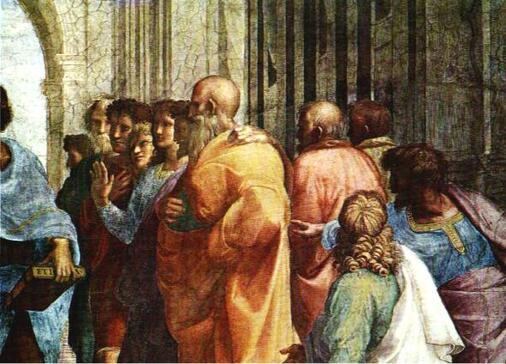Acts 17:16-34
Lesson 261
Read both the "King James Bible" and the "New Living Translation."
In this lesson:
The philosophers of Mars' Hill.
The philosophers of Athens.
Painting by the Italian artist and architect Raffaello Sanzio da Urbino (1483-1520).
Painting by the Italian artist and architect Raffaello Sanzio da Urbino (1483-1520).
Who were the -
Epicureans -
Epicureans were followers of the Greek philosopher Epicurus (341-270 BC). Epicurus believed that life was created by mere chance without divine intervention and that everything is made up of atoms, including us. He taught that when we die, the atoms scatter and form new objects. Therefore, there is no afterlife or any reason to prepare for it. Epicurus believed there were many gods, each living their own blissful lives' with scant interest in the affairs of man and caring little if we prayed to them. He taught that finding pleasure was more important than finding truth. Epicurus advised seeking out as much material happiness and sensual enjoyment as possible, especially when it came to food and self-indulgence.
Stoics -
Followers of the Hellenistic philosopher Zeno of Citium (335-263 BC). Zeno taught that we are merely a small part of nature, and happiness comes from living in harmony with it. Stoics believed that emotions are immaterial, and we should bear grief, disappointment, and joy with indifference. According to stoicism, we should shun materialism and seek logic and reason. The stoics' highest goal was discipline and self-sufficiency; without them, a person should consider suicide. Zeno believed in an afterlife but taught that when we die, our soul loses its individuality and becomes part of one universal soul.
Epicureans -
Epicureans were followers of the Greek philosopher Epicurus (341-270 BC). Epicurus believed that life was created by mere chance without divine intervention and that everything is made up of atoms, including us. He taught that when we die, the atoms scatter and form new objects. Therefore, there is no afterlife or any reason to prepare for it. Epicurus believed there were many gods, each living their own blissful lives' with scant interest in the affairs of man and caring little if we prayed to them. He taught that finding pleasure was more important than finding truth. Epicurus advised seeking out as much material happiness and sensual enjoyment as possible, especially when it came to food and self-indulgence.
Stoics -
Followers of the Hellenistic philosopher Zeno of Citium (335-263 BC). Zeno taught that we are merely a small part of nature, and happiness comes from living in harmony with it. Stoics believed that emotions are immaterial, and we should bear grief, disappointment, and joy with indifference. According to stoicism, we should shun materialism and seek logic and reason. The stoics' highest goal was discipline and self-sufficiency; without them, a person should consider suicide. Zeno believed in an afterlife but taught that when we die, our soul loses its individuality and becomes part of one universal soul.
Study Tip:
The Bible can be complex, so it helps to study more than one translation. As you read each lesson, scroll back and forth between the "King James Version" and the "New Living Translation" below.
Also, check the margin notes in blue and click on the links.
The Bible can be complex, so it helps to study more than one translation. As you read each lesson, scroll back and forth between the "King James Version" and the "New Living Translation" below.
Also, check the margin notes in blue and click on the links.




